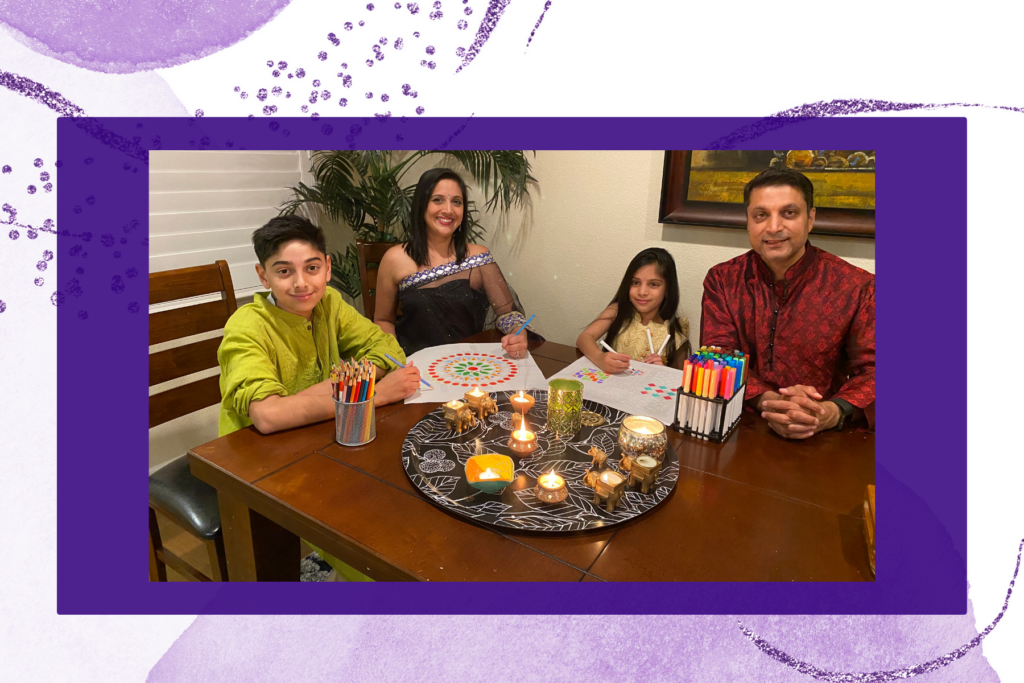
Diwali celebrates “how light will always prevail over darkness,” and this year, our kids need to celebrate the festival of lights more than ever. The rapid spread of COVID-19 lead our kids down a narrow path towards the darkness. They no longer go to school in-person, they don’t get to see their friends, celebrations were abruptly canceled, and they were exposed to the reality of what happens to Black lives in America. Daily, they witness some kind of protest, and in parts of the country, they experience curfews, wildfires, and hurricanes.
[Read Related: Explaining Black Lives Matter to Kids]
To our kids, it has felt like they are lost in a dark forest — just like Prince Rama was. My call to action is for parents this year is to create new Diwali traditions, which will allow for our children to see the light and to thrive in an unknown world. We need to show our kids what it means to be resilient. We need to listen to their concerns, parent proactively versus reactively, and remember that even when Prince Rama was in a dark, dangerous forest full of obstacles, light was able to overcome darkness.
Our kids worry too!
During one of my walks with my daughter, I realized the randomness of the worries our kids have. My daughter was worried about how she might grow out of the new Indian clothes her dad brought back for her from India. She didn’t think she would have a chance to wear it because we probably weren’t attending any Indian celebrations this year. It baffled me that she was thinking about Indian celebrations with all that was going on. Simultaneously, I accepted that I have not had time to process the impact of the pandemic on our lives. I was living reactively; constantly reacting to the chaos in front of me.
View this post on Instagram
The pandemic has been difficult for parents who are now in constant 24/7 caretaking, housekeeping, and be-everything-to-everyone-mode. Parents are also juggling various life stressors: overworking, financial strain, and processing varied psychological stressors due to these abrupt changes. This has left many of us parenting in ways that are not optimal for our children. I realized that while I am physically around for my kids, psychologically, I’m not. Often, I can be emotionally distant when we talk, irritable when I am stressed, and demanding when I need them to do something.
The importance of nurture and structure
In my Contemporary Parenting class at San Jose State University, I teach about the importance of nurture and structure. Providing both is associated with the authoritative parenting style and yields optimal outcomes. This parenting style also requires a lot of time, effort, and patience. Nurture is being responsive to a child’s developmental needs, while structure is providing them with consistency. Our children developmentally need us to celebrate their cultural identity and heritage through Diwali (i.e. nurture), and provide consistency through celebrating traditions we have and will create for them (i.e. structure). Family traditions bond families together and give children a sense of normalcy, which is especially important presently.
Once I had a chance to really listen to my daughter and process her worry, I realized that this is a worry that parents have control over. We can’t control when the pandemic will be over, or when they will go to school, but we can control how we celebrate Diwali this year. We can combine our pre-pandemic Diwali celebrations with our post-pandemic Diwali celebrations so they can continue to maintain our heritage, traditions, and values. To tune in to our kids’ emotional needs, we can ask our kids what they want to do for Diwali this year.
[Read Related: 4 Ways to Pass on Cultural Traditions to Children: Tips for Parents]
What can we, as parents, do to make this time easier for our children?
In my book, “Lights, Camera, Diwali!” the main character, Dia, goes around the house celebrating Diwali with her family in different ways. They create family traditions together: getting gifts, creating rangoli designs, painting clay lamps, making ladoos, and of course using sparklers and firecrackers to light up the night sky. Usually, I decide how we are going to celebrate Diwali. This year I’m going to hand the torch over to them. Try it! Ask your kids what they want to do for Diwali and do it — even if it is getting them gifts! Trust me, they need to see the light at the end of their dark forest.
View this post on Instagram
We have a collectivistic culture. We prioritize relationships, being together, celebrating with one another, and helping one another out. However, with the pandemic and sheltering-in-place orders, it’s become much harder to connect with each other. Even though we won’t be able to celebrate Diwali the same way this year, I don’t want our kids to feel more darkness on Diwali. I want to show them that South Asian Americans are resilient and whatever life throws at us — we figure it out! I want to challenge us all to find creative ways to #LightupDiwali2020. Let’s start new Diwali traditions that we will continue even after the pandemic is over.
[Read Related: A Yoga Teacher’s Take on Navigating Stress and Anxiety With the Help of Veda Warrior’s Plant-Based Vitamins]
How can you get involved?
This year, I will be doing a LIVE Insta-reading of “Lights, Camera, Diwali!” on November 14th on my Instagram for our kids. You can also earn how to sponsor your very own Diwali coloring contest and connect with others in your community here.
Happy Diwali to everyone! Let’s show our kids how to light up our homes, minds, and hearts in the midst of the darkness surrounding us. Use the hashtag: #LightupDiwali2020 to showcase what your kids are doing to virtually celebrate Diwali this year.




